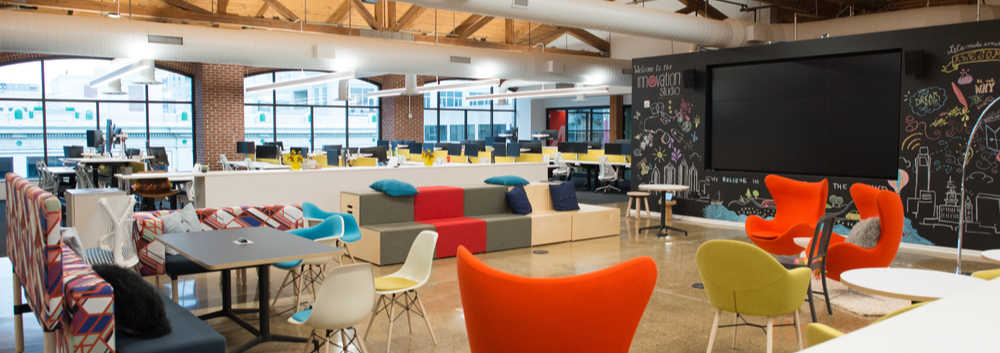WeWork, JLL, Aviva: Hybrid model of work to change the office
- 4 Min Read
Emphasis placed on collaborative spaces
- Author: Jeremy Chan
- Date published: Feb 1, 2021
- Categories

As businesses look to incorporate remote working into their post-pandemic plans, a new hybrid model will drastically change the office as a physical space, with companies such as Aviva announcing plans to create a “collaborative” environment.
“Nothing is worse than being in an office where you’re rattling around with a few people in a large space. We accept the fact that we have fewer people coming into larger offices, we’re trying to consolidate the space to create more of a buzz and to make sure that we have more collaborative interactions,” says Stuart Wright, group property and facilities director at Aviva.
Pre-pandemic, a typical office would reserve about 60 to 70 percent of floor space for desks with the remainder set aside for meeting/collaborative spaces, food and beverage and amenities. Post-pandemic, that ratio may reversed.
“The physical desk space will probably be only 30 to 40 percent of an office,” says Mark Caskey, CEO of EMEA Corporate Solutions at JLL, a property firm. “The overwhelming majority of the aspects in an office will be geared towards innovation, collaboration, social spaces, food and beverage offerings and other amenities.”
Planning ahead, Wright says Aviva is already surveying employees on what they want in the ‘new office’.
Whereas previously Wright used metrics like desks per full-time position when discussing office planning, he says the pandemic has broken the relationship between square footage and people.
“We’re moving more to a purpose-based use of offices, and we need to think about it in a different way. Historically, if someone asked me to get a quote for a certain number of people, I would have done a simple calculation. Now we need to understand how people are using offices,” he says.
Location
While it’s too early to say if a preference will develop on where the ‘new office’ will be located, Caskey says companies are already investing in increasing the quality of their downtown/central business district offices.
“We call it the flight to quality.”
“If you’re going to have assets in prime locations, there will be a greater requirement to have high quality, rich-in-amenities offices. If an employee has a choice, they can either work from home/anywhere, or they can work in an office, and there needs to be value for the employee in those office environments.”
Mathieu Proust, WeWork’s general manager for UK, Ireland and emerging markets echoed this sentiment.
“With these new ways of working, when people do come together, it needs to be in convenient and attractive locations,” he said in an email. “We know from our members that they still want to be in cities – city locations address the need for a central hub and great locations will always be key for talent attraction.”
Leasing office space
The adaptability of office time has also meant that office leasing is also moving towards shorter and more flexible contracts.
“The pandemic has accelerated a shift towards flexibility. Companies are now increasing the share of flex space in their real estate portfolio and swapping longer term conventional leases for shorter, scalable commitments that allow them to spread their workforce across cities or multiple countries,” Proust said.
“Flexibility is key here – it makes sense for businesses to have a space that can change and grow with them. It is a trend we have been seeing for the past 10 years, and is now more important than ever.”
Wright says businesses will be more inclined to take shorter or more flexible leasing arrangements but also adds that the pandemic may also place greater emphasis on the need to fully control an office space.
“If companies are going to have less space, they may actually want to have more of that space under their own control,” he says. “We’ve opened the offices where we are the landlord and in full control but haven’t yet opened the offices where we are a part occupant in a larger building.”
“We can guarantee an office is ‘coronavirus-secure’, where we have control.”
Overall, as the office becomes optional, Caskey believes the pandemic has accelerated the link between the workplace and a company’s culture.
“Increasingly the feedback we get is: top talent will have a view of the quality of the office environment that they want to work in when they choose a company to whom they want to work for,” he says.
“The value of real estate has around the culture of an organisation, the talent, attraction and retention of employees within an organization has never been so strong.”



